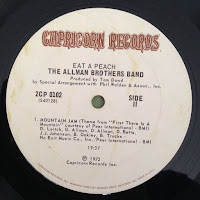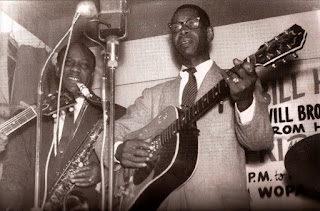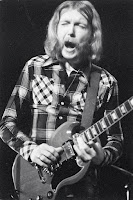"It took Jaimoe and I about forty-five seconds to get our groove back. We
started playing ’In Memory of Elizabeth Reed,’ and once we hit the jam,
tears just started rolling down my cheeks. I said to myself, ’So
this is what’s been missing from my life.’"
- Butch Trucks, 1990, Modern Drummer
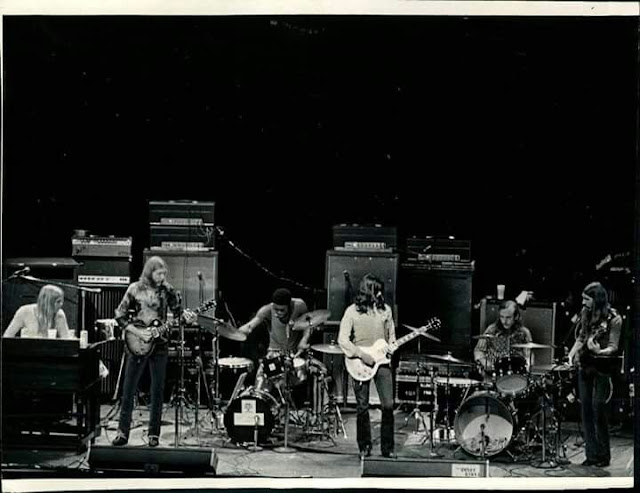 |
| The Allman Brothers, 1971 |
They say that guitar players watch the guitar players, the bassists watch the bassists, and the drummers watch the drummers. Not me. Even though I mostly play guitar (some bass, piano, mandolin, sax...) when I go to a concert, I find myself watching, often fixated on, the drummers mostly
because I don't play drums. I
can keep a beat well enough - the cow bell is totally doable - but
simultaneously combining a snare,
hi-hat, and a bass drum, seems like an Olympic feet to me. It's freaking fascinating. Guitarists stand in the spotlight and get the glory, bassists have a certain inglorious mystique as the glue between rhythm and melody, but drummers are the backbone of every great band and they are in constant motion. Jams I've been a part of get absolutely lost in the woods without a time keeper, meanwhile, we all nod and smile at
This is Spinal Tap's running joke about the how interchangeable drummers are.
 |
| Jaimoe, Butch Trucks, Duane Allman |
Drummers substitutions may go unnoticed in bands that suck, but The Allman Brothers Band was literally built around its rhythm section. The first person Duane Allman rounded up was jazz & soul drummer Jaimoe, followed by bassist Berry Oakley, and second drummer Butch Trucks - Dickey Betts and Gregg Allman were added
last. For all of the Guitar God talk about Duane & Dickey, Duane was experienced enough to know he needed a solid core before he started exploring the guitar jam nebula. Many assume that Duane wanted 2 drummers because he patterned his band after fellow jammers the Grateful Dead, but it was a while before the Allmans had much in common with the Dead (they were less of an influence and more contemporaries). According to Duane, he wanted 2 drummers because James Brown had 2 drummers (though legend has it that The Godfather of Soul employed 2 drummers in case he fired one in the middle of a show).
 |
| Duane Allman, Jaimoe, Dickey Betts, Butch Trucks |
Butch and Jaimoe played together like few percussion sections have in pop music. They never stepped on each others' toes, Butch drove the train leaving Jaimoe free to roam. Often 2 drummers can be a train wreck, either they sound like they are playing 2 different songs, or doubling the exact same parts. Not Jaimoe and Butch. They blended effortlessly just as the jazz percussion sections of the 1950s and 60s did. And once they added percussionist Marc Quiñones in 1991, the rhythm section became an absolute powerhouse. Only the best musicians could keep up. There are a lot of jokes out there about Allman Brothers' drum solos (even
The Simpsons made reference), and for every percussion showcase that didn't go anywhere and turned into an intermission for fans, you'd have 3 or 4 others that were transcendent. This was no bathroom break, this was a moment of glorious rhythm and melody.
That's right,
melody. It may surprise some people, but drums are
tuned, and even a novice ear can tell when a tom is out of tune. Listen to the "Mountain Jam" drum section on
Ludlow Garage and you hear something almost hummable on top of Butch & Jaimoe's beats. Those who tuned out when the guitars take a break on "In Memory of Elizabeth Reed" will recognize when the melody is coming back because Butch and Jaimoe are telling you it is.
And now it is no more. Butch Trucks left us, very suddenly, at the age of 69.
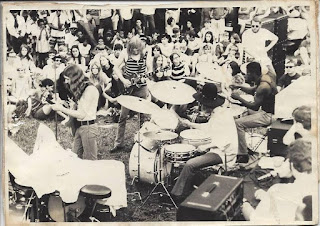 |
| The Allman Brothers in the Park |
The Allman Brothers has always prided itself as a band of the people, and Butch has been the closest conduit fans have had in recent years. While Gregg shies from the media for the most part (save for perfunctory local interviews when in a given town), Butch was more than happy to not only take the mic, let alone jump on a message board or engage in a facebook conversations. As far as I can tell, Butch was among the first people to email a positive response to the first
Allman Brothers animation I created. At Wanee Fest, he and Jaimoe, and Marc, and Oteil, would stroll through the camps of known, long time fans to say hello and chat. Butch enjoyed the spotlight and his bullhorn, but he understood that playing music that oneself enjoys can be self-indulgent without a group of people who want to hear it.
 |
| quickly thanking Butch |
After the Allman Brothers played their final show in 2014, band members moved on to their own varied solo projects, but Butch seemed to feel the need to keep the torch burning, the very one that Duane Allman lit for Gregg, Dickey, Berry, and Jaimoe, and so many others, in 1969. He started not one but
two Allman Brothers-related bands: The Freight Train Band, largely made up of young Florida musicians or honors students from Butch's rock & roll camp, Roots Rock, which toured extensively up and down the east coast; and Les Brers, made up mostly of Allman Brothers alums and played fewer dates at larger venues. I was fortunate to see The Freight Train perform in late December, one of his last shows, and this was no tribute act. This was Butch as leader and teacher, pushing young musicians to their potential just as Duane had done for him so many years ago. And of course, having a blast the whole time, even chatting with any knucklehead with a couple of beers in them in the parking lot after the show, even though I'm sure he was exhausted.
As a band of the people, fans of the Allman Brothers often feel like a
collective family, and not just because the band was literally made up of
family. Every show, the stage was a family affair, not just on, but backstage as well. Butch was well-known family man who brought children
and grandchildren on tour with him often. Even his son and daughter have played
in his recent bands when they could. That familial bond extended to
the vast community of people it has brought together and from that, the band members become like family to fans. There is a deep
caring for the people that maybe fans of the Rolling Stones or Eagles
never gained. Glenn Frey is famous and an icon, but was he as beloved as
much as the music he made?
Duane Allman's messianic shadow looms large over the band, but especially, it seemed, for Butch. He often eagerly repeated stories of Duane's impact upon him, saving him from a life as a high school math teacher. Butch seemed to feel the need to spread the Gospel that Duane preached, often referring to he and his fellow Allman Brothers as "Apostles". It kept the band going for 45 years, at times beyond reason considering the specter of tragedy. For a band filled with as much tragedy as the Allman Brothers have had, it would seem unfathomable that a band member would
choose to leave us. But suicide is only rational to a single person in a single moment, and as much as the band feels like family, this is a stark reminder that for all of Butch's candor, we fans only see 3 of the best hours of a musicians' day: on stage, under the lights, doing what they love most, preaching to their adoring choir. Searching for reason is fruitless, and nowhere to be found in Butch's final interview, given just hours before he left us, in which he spoke of mostly the future: upcoming tours, Roots Rock Camp, his garden in the south of France.
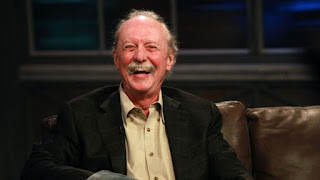 |
| Butch Trucks |
Even though the Allman Brothers' music has had an immeasurable impact on me, I still found myself surprised at how much Butch's death affected me. Butch was an intense personality, which I always appreciated, but I tend to separate my love of the music from the personalities that made it. But when I read the rumors of Butch's passing that night, I couldn't sleep until I convinced myself that the cryptic chatter was only rumor. When it was all confirmed the next day it really hit me, I was absolutely crushed, perhaps irrationally considering this was a person who I had only spoken a few superficial words to a month prior. But the Allman Brothers are the sound track to my life, they inspired animations I've made and the music I love to play. This man's art affected my life greatly, as he did so many countless others, as not only an artist, but as a teacher.
After surviving the tragic deaths of Duane and Berry, many fans felt the remaining members escaped tragedy themselves, thereby earning the right to carry on indefinitely until old age, exacerbated by a long life on the road, caught up. But searching for meaning is irrelevant for those of us who are reminded that we are on the outside looking in, fortunate just to have this wonderful music. Our lives aren't defined by how we leave, especially a life as colorful as Butch's, who inspired so many young musicians, and likely will for years to come. So while I still don't fully understand drums, and likely never will, it is irrelevant because I will keep listening and watching all the same. And I will never witness drums played played better than by Butch and Jaimoe.
*** Author's Note: if any of these photos used are yours or you know the artist, please let me know so I can credit ***



